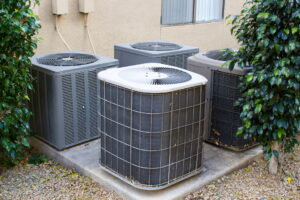 Humidity and air temperature are intertwined in many ways. When temperatures drop in the wintertime, humidity also drops because cold temperatures reduce humidity and cause the air to dry up. Similarly with heat during the summertime, more hot temperatures mean more water getting evaporated and existing in the atmosphere as water vapor. Basically, you can’t think about air conditioning without also thinking about humidity!
Humidity and air temperature are intertwined in many ways. When temperatures drop in the wintertime, humidity also drops because cold temperatures reduce humidity and cause the air to dry up. Similarly with heat during the summertime, more hot temperatures mean more water getting evaporated and existing in the atmosphere as water vapor. Basically, you can’t think about air conditioning without also thinking about humidity!
Today, we want to talk to you about how your air conditioning in Logansport, LA handles humidity, and how you can help. By understanding the interaction between an air conditioner and the muggy temperatures we encounter here in Louisianna, you’ll have a better understanding of what to do when your AC encounters problems.
Remember, if you need help with your air conditioning, or if you need an extra hand dealing with excess humidity, don’t forget to call our team of professionals. We’re your local doctor of home comfort!
Our Explanation of Muggy Weather
Before we talk about our technological solutions for muggy weather, we need to talk about the science behind humidity and air conditioning. As temperatures rise and the sun beats down on the ocean and our beautiful lakes, water begins to evaporate and travel through the air as vapor. This is why hot, summer weather is usually associated with an increased level of humidity!
However, our bodies rely on dry air to cool down. As temperatures increase, the human body sweats water that is intended to be evaporated by the atmosphere which in turn cools us down. This is why we sweat, and why sweating helps regulate our internal temperature!
The more humidity that exists in the atmosphere, the harder it’s going to be for our sweat to evaporate. This means that muggy weather makes us feel hotter, even if the temperatures aren’t record-breaking. Combating humidity is a necessary step in cooling down, and that’s where our air conditioners and dehumidifiers come in.
Your Air Conditioner Is Not a Dehumidifier
While an air conditioner can provide a basic level of dehumidification, that’s not its sole purpose. In fact, dehumidification is more of a byproduct of air conditioning than its function. As your air conditioner pulls heat from the air, it also pulls moisture out of it, which is sent through a condensate drain and deposited outside on your property. The more humidity that exists in your indoor air, the harder your air conditioner has to work to cool things down and keep things dry. This means you’ll see a shorter system lifespan and repair needs crop up if you don’t have proper humidity control in your home.
Create a Whole Home System
Luckily, there are a few things you can do as a homeowner to help your air conditioner and improve conditions in your home.
- Invest in a dehumidifier. Many homeowners don’t know that they can actually use a dehumidifier in conjunction with an air conditioner to provide powerful cooling during the summer. If you allow the dehumidifier to remove moisture and the air conditioner to focus on cooling, your home will be made more comfortable without stressing the AC and causing an increase in energy consumption.
- Call for AC repairs and maintenance. Your AC should be in good shape to help regulate temperature during our hot summer months. We can help you achieve this goal.
- Use a ceiling fan. Ceiling fans can help things in your home feel cooler, which is important on an exceptionally muggy day.


